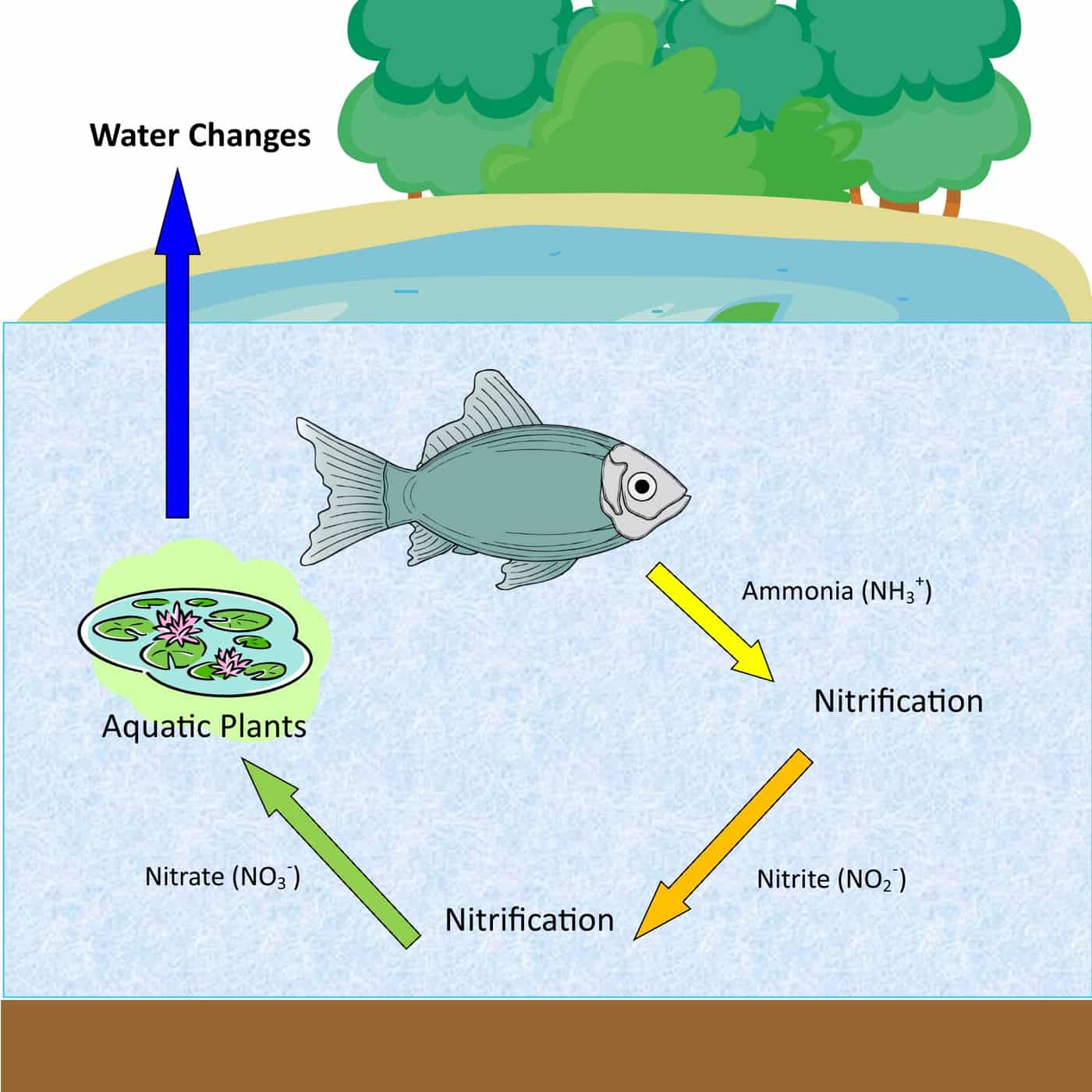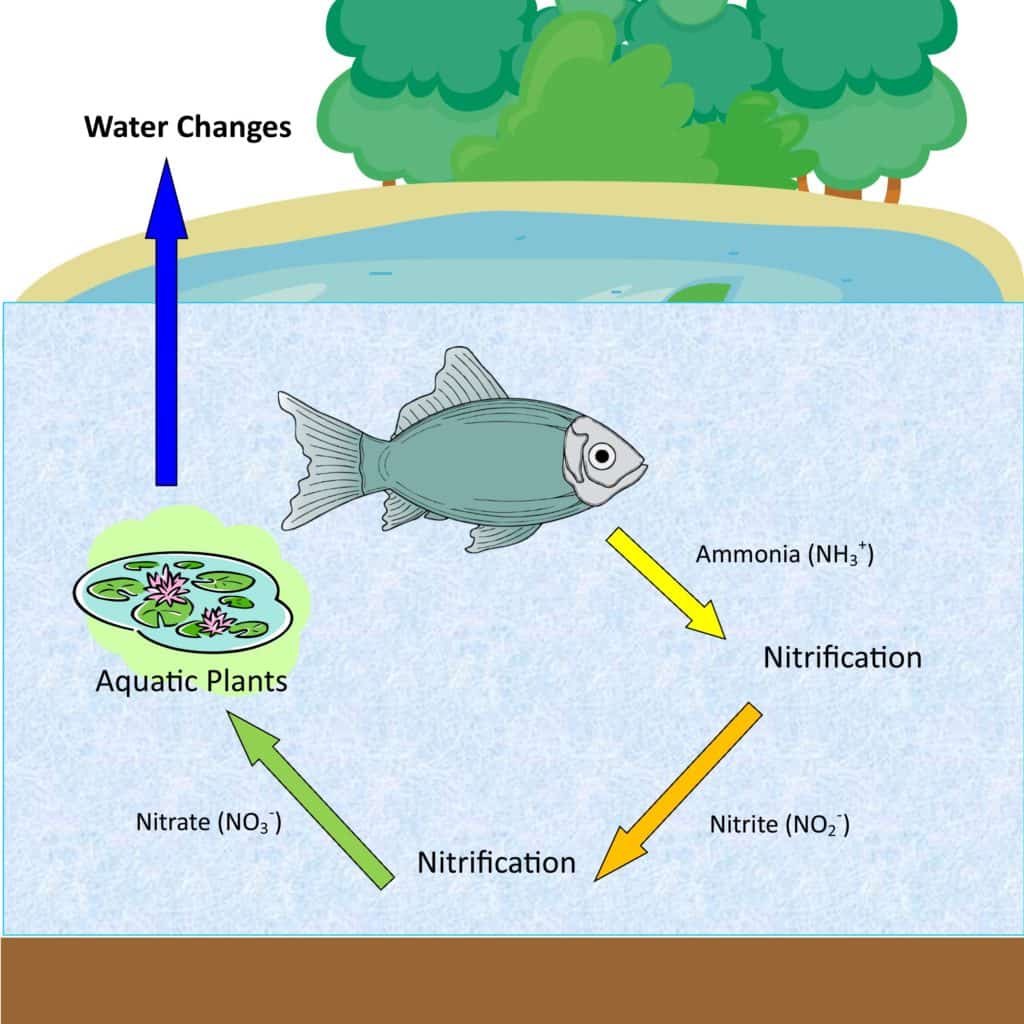** Post contains affiliate links. **
As you may well know, water quality is a significant aspect of pet fish health. One of the most critical pathways in fish health is the nitrogen cycle, responsible for processing the primary fish waste: ammonia. Like the air we breathe, the water a fish swims in is directly linked to their overall health. As a fish veterinarian, we routinely test the water our patients swim in for various parameters. We discussed pH and kH previous, so today, let’s look at the nitrogen cycle.
The Nitrogen Cycle

As you may notice, the traditional Nitrobacter and Nitrosomas bacteria species have been omitted from this diagram. This is due to the fact that there are just SO MANY different bacteria species involved in nitrogen-fixation, that we cannot simply define them in these two genuses.
In a fish tank, a fish’s primary waste is ammonia. Ammonia is produced by the breakdown of protein, the main staple of most fishes’ diets. Ammonia is excreted out through the urinary tract and gills. Ammonia is highly toxic to fish, causing death and increased secondary illness, so it is converted, through nitrogen-fixing bacteria, into nitrite. Now, nitrite can be just as bad as ammonia. Methemoglobinemia, or “Brown Blood Disease,” is caused by a build-up of nitrite. Nitrite can bind to hemoglobin in the blood and outcompete oxygen. This causes a brown coloration and the fish will asphyxiate from lack of oxygen. Thankfully, more nitrogen-fixing bacteria convert nitrite into the final nitrate. Nitrate is safe for fish at low levels, but at higher levels, and depending on the fish species‘ tolerance, can cause the same issues as high ammonia. Nitrate is removed from the system by aquatic plants or water changes.
In established systems (over 2 months old with no new fish or equipment), your ammonia should be ZERO. Most low readings indicate your filtration capacity is inadequate or secondary to overfeeding. The highest reading acceptable on our test kit is 0.1 mg/L. The traditional API freshwater master test kit ranges between 0-0.25, so attaining a 0.1 reading will not occur. Due to the broad range of values, a 0.25 reading may be a false positive (reporting a higher value than what is actually present).
There are many commercial additives for removing ammonia from your tank prior to the nitrogen cycle. Some can cause ammonia test kits to read falsely high. These additives are short-term solutions that should only be used with significant health issues. They are not a long term maintenance solution. You MUST establish your biological filtration (good bacteria) for long-term fish health. If you have persistent ammonia in your tank, consider the following solutions:
- Is your filtration adequate? Tanks with higher bioloads (size and number of fish) will require more than standard filtration. When in doubt, always filter more than you should.
- Are you feeding appropriately? Remember, ammonia is produced from breakdown of protein in a fish’s diet. More food = more ammonia. Check your protein levels! For more information on fish diets, read this.
- Are you doing lots of water changes? If you are constantly removing ammonia, your nitrogen-fixing bacteria will never become established.
- Is there ammonia in your source water? Check the level coming out of your tap or well to make sure! You may need to consider another water source.
There are also commercial additives that will “quick start” your nitrogen cycle. Sorry folks, but these are a complete scam. With the exception of one product that slightly shortened the establishment of your nitrogen cycle, it will take 4-6 weeks MINIMUM to get your tank properly cycled. By “cycled,” we mean the establishment of a complete nitrogen cycle with ammonia being converted all the way to nitrate. We recommend starting with very few fish and monitor your ammonia, nitrite and nitrate levels carefully!


Pingback: The Truth About Aquatic Plants – Aquatic Veterinary Services
Pingback: The Green Pea Myth – Aquatic Veterinary Services
Pingback: Stop Replacing Your Filters!! – Aquatic Veterinary Services
Pingback: Top 10 Mistakes All New Fish Owners Make – Aquatic Veterinary Services
Pingback: New Tank Syndrome – Aquatic Veterinary Services
Pingback: Top 10 Mistakes New Fish Owners Make – #7 – Aquatic Veterinary Services
Pingback: Top 10 Mistakes New Fish Owners Make – #5 – Aquatic Veterinary Services
Pingback: Top 10 Mistakes New Fish Owners Make – #4 – Aquatic Veterinary Services
Pingback: Fish Bowl Syndrome – Aquatic Veterinary Services
Pingback: Fish System Cycling – Aquatic Veterinary Services
Pingback: Fish Bowl Syndrome - Aquatic Veterinary Services
Pingback: Top 10 Mistakes All New Fish Owners Make - Aquatic Veterinary Services
Pingback: Feeding Fish Green Peas - Aquatic Veterinary Services
Pingback: The Truth About Curled-Gill Goldfish: Vet-Reviewed Science & Info! - Pet Follower | Pet Guides, Health & Gear Articles by Pet Lovers & Veterinarians